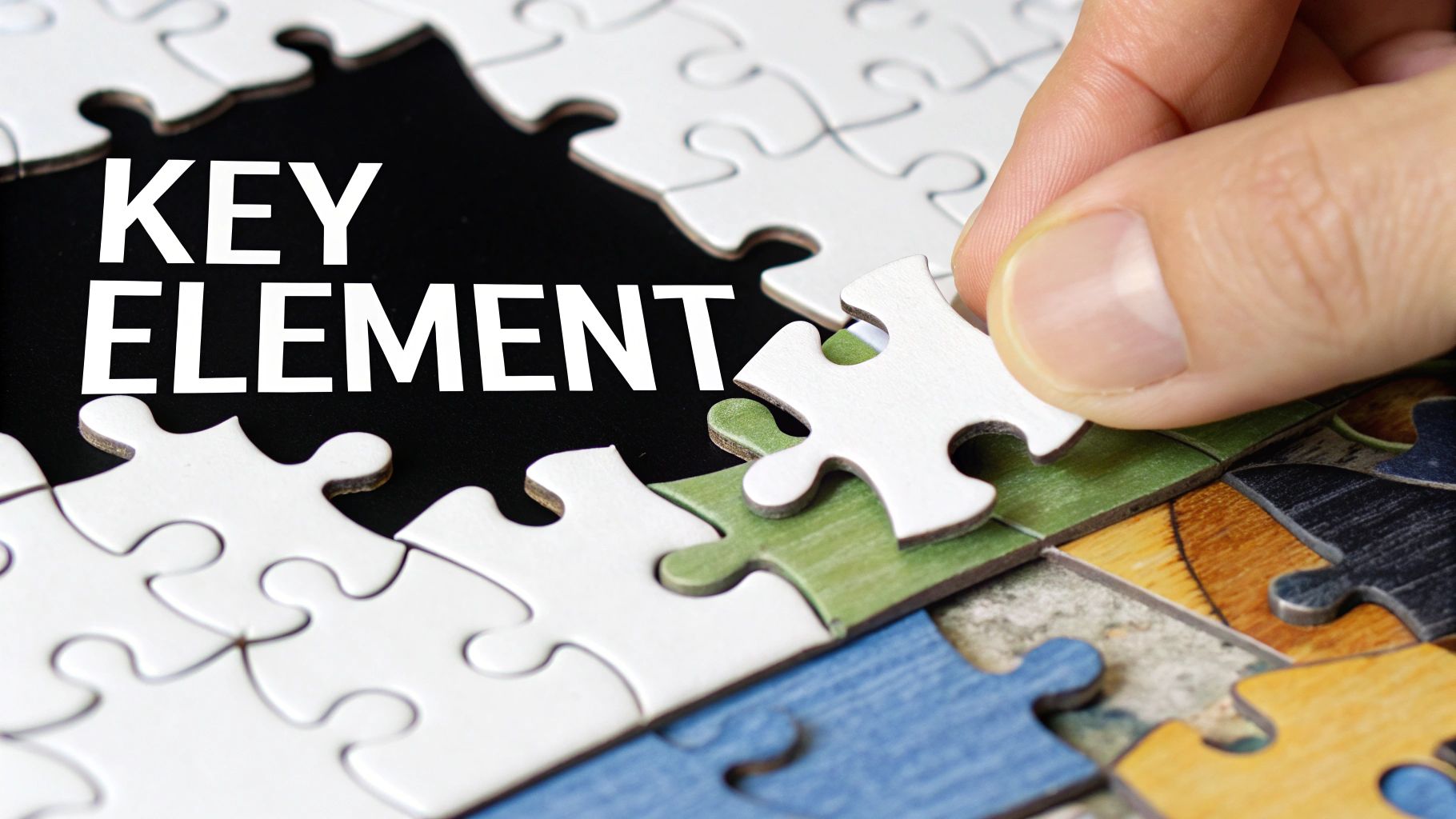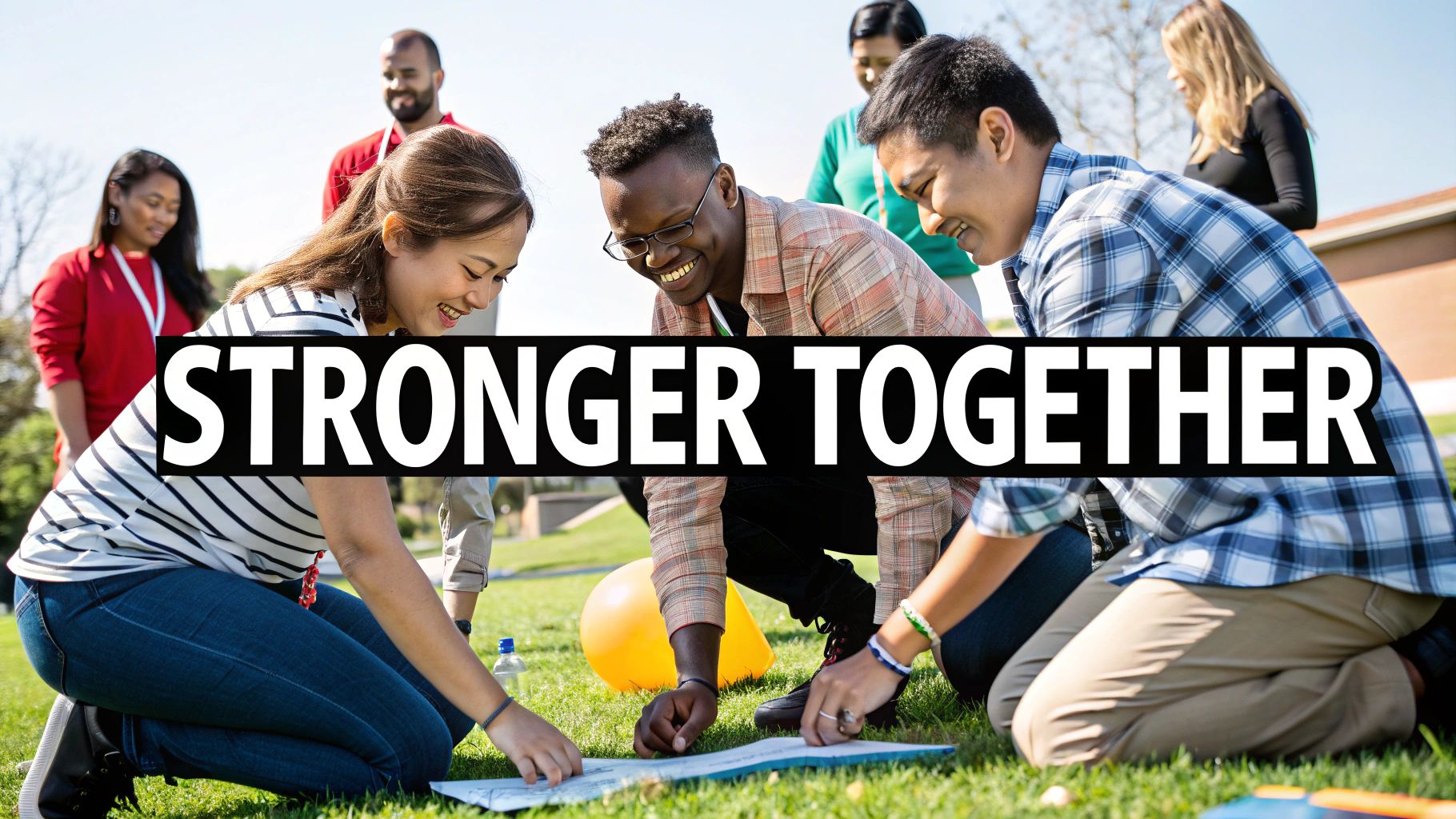Understanding the Economic Power of Trust

Trust does far more than build social bonds – it's a key factor that drives economic success. When people and organizations trust each other, business flows more smoothly, innovation thrives, and economies grow faster. The data shows this clearly: countries with higher trust levels consistently perform better economically than those where mistrust prevails.
How Trust Fuels Economic Prosperity
One of trust's biggest economic benefits is that it cuts down on transaction costs. When businesses trust their partners, they spend less time and money on detailed contracts, constant monitoring, and enforcement. For example, a handshake deal between long-term business partners can replace months of legal back-and-forth. This frees up resources that companies can invest in growth and development instead.
Trust also makes a country more attractive to foreign investors. When investors feel confident in a nation's laws, regulations, and business environment, they're more likely to put money into local companies and projects. This outside investment creates jobs, spurs economic growth, and raises living standards for local communities.
High-trust societies also tend to have better public infrastructure. When citizens trust their government to use tax dollars wisely, they support funding for roads, schools, hospitals and other crucial projects. The link between trust and prosperity shows up clearly in global research. As reported in the World Values Survey, nations like Norway and Sweden, where over 60% of people say they trust others, rank among the world's richest countries.
Measuring the Economic Impact of Trust
While trust's exact economic value is hard to calculate, several key metrics help reveal its influence:
- Foreign direct investment levels: More FDI typically means higher trust in a country's stability
- Business environment: Simple regulations and efficient processes point to trust-based systems
- Corruption rates: Less corruption shows stronger trust in institutions
- Social capital: Strong community ties reflect high interpersonal trust
Building Trust-Centered Economic Strategies
Understanding trust's role in economic growth helps leaders develop better policies. Key focus areas include:
- Making government and business operations more open and accountable
- Creating stronger legal protections for property rights and contracts
- Supporting education and social programs that build community bonds
- Promoting ethical business practices and corporate responsibility
Building trust takes time and effort, but the economic rewards make it worthwhile. When people and organizations trust each other, they can work together more effectively to create lasting prosperity that benefits everyone.
Trust in Healthcare: A Foundation for Better Outcomes

The relationship between patients and healthcare providers hinges on trust. When patients believe in their medical team and the care they receive, it creates the foundation for successful treatment. This essential connection goes beyond just feeling at ease during appointments – it shapes how people engage with healthcare services and influences their health outcomes.
The Impact of Trust on Patient Outcomes
When patients trust their healthcare providers, they're more likely to share detailed information about their symptoms and medical history. For instance, someone who feels comfortable with their doctor will openly discuss sensitive health issues or lifestyle factors that could affect their treatment. This honest exchange helps doctors make more accurate diagnoses and develop effective care plans.
Treatment adherence improves significantly when trust exists between patients and providers. People who have faith in their doctor's expertise are more inclined to take medications as prescribed, show up for follow-up visits, and stick to recommended lifestyle changes. These behaviors directly contribute to better health results and fewer complications. You might be interested in: How to master…
Building Trust Across Diverse Patient Populations
Creating trust becomes especially important when addressing health inequities among different communities. To improve care quality and reduce disparities, healthcare systems must gather and analyze data about patient demographics, including race, ethnicity, and language preferences. Learn more about reducing disparities in healthcare. This process requires acknowledging past mistakes in healthcare and current systemic issues while showing real commitment to providing care that respects each community's unique needs.
Strategies for Building Trust in Healthcare
Healthcare organizations can strengthen patient trust through several proven approaches:
- Transparency: Clear communication about treatments, costs, and possible risks
- Active Listening: Giving full attention to patient concerns and showing genuine understanding
- Shared Decision-Making: Including patients in discussions about their care options
- Consistent and Reliable Care: Delivering quality service reliably across all interactions
- Accountability: Openly addressing mistakes and making visible improvements
Measuring and Strengthening Trust
Regular patient surveys and feedback programs help healthcare organizations track trust levels and identify areas needing improvement. Building trust within medical teams is equally vital – when healthcare workers trust each other, they communicate better and work together more effectively on complex cases. This positive internal environment creates better experiences for both staff and patients. Strong trust relationships at all levels help create healthcare systems that truly serve their communities and lead to improved health outcomes for everyone involved.
Cultural Institutions and Trust Building

Museums, historical societies, and other cultural institutions serve as guardians of our shared history and knowledge. Their role goes beyond simply housing artifacts – they actively shape how communities understand and connect with their heritage. Building public trust is essential for these institutions to fulfill their mission effectively.
Transparency and Accessibility: The Foundation of Trust
Being open about operations builds credibility. When cultural institutions share details about their collections, funding sources, and decision-making, it helps people understand and trust their work. Many museums now publish detailed annual reports online that show exactly how they use their resources. Making exhibits and programs easily accessible to everyone strengthens these bonds of trust.
The public's faith in history museums and historic sites is remarkably strong. A 2018 study by the American Association for State and Local History found that 81% of people consider these institutions trustworthy sources of historical information. This high level of confidence shows how much people rely on cultural organizations to tell accurate stories about our past.
Engaging Diverse Audiences: Meeting Different Needs
Each community has its own perspective and needs. Smart cultural institutions recognize this and create programs that resonate with different groups. This might mean developing hands-on activities for young visitors or creating exhibits that highlight local community stories and traditions.
Building Trust Through Community Engagement
Local connections matter deeply. When cultural institutions host community events, work with nearby schools, or offer free admission days, they show their commitment to serving everyone. These activities create natural opportunities for people to interact with and learn from these institutions.
Measuring and Maintaining Trust: A Continuous Process
Trust requires constant attention and care. Cultural institutions regularly check how well they're connecting with visitors through surveys, comment cards, and social media feedback. This helps them understand what's working and what needs improvement. By staying focused on openness, engagement and responsiveness, these institutions remain vital community resources that people turn to for reliable knowledge and meaningful experiences.
The Psychology Behind Lasting Trust

Trust shapes every meaningful relationship we build. Whether in business partnerships, friendships, or romantic connections, trust emerges from a mix of emotional responses and rational decisions. Understanding how trust works helps us build stronger bonds and make better choices about who to rely on.
The Neurological Basis of Trust
Our brains are wired for trust through specific chemical reactions. The hormone oxytocin plays a key role in this process. Often called the "trust molecule," oxytocin helps us feel connected to others and more willing to cooperate. This biological response shows how deeply trust is embedded in human nature and social interactions.
Cognitive Processes That Shape Trust
Several mental factors influence whether we trust someone:
- Consistency: We trust people who match their words with actions over time
- Competence: We rely more on those who show real skill in their field
- Benevolence: People who show genuine care for others earn more trust
- Integrity: Strong moral principles and honest behavior build confidence
Applying Psychological Principles to Build Trust
These insights help us build real trust in our daily lives. For example, when working with others, showing your expertise through clear communication and finished projects naturally builds credibility. Learn more about growing your professional relationships in our guide on navigating your career path. Being open and reliable in your communication also helps others understand and trust your intentions.
Overcoming Trust Barriers
Trust is easy to break but hard to rebuild. When trust breaks through dishonesty or betrayal, fixing it takes real work. The path forward requires owning up to mistakes, showing genuine change, and proving reliability over time. Quick fixes don't work – rebuilding trust needs patience and consistent effort from both sides.
Creating Environments That Foster Trust
Trust needs the right conditions to grow. This means creating spaces where people feel safe sharing ideas, working together, and showing appreciation for each other. When team members feel valued and respected, trust develops naturally. Strong trust leads to better teamwork, deeper relationships, and more success in both work and personal life.
Building Trust in Online Environments
Trust works differently online than it does in person. Without the benefit of body language and tone of voice that we rely on face-to-face, we need different ways to build confidence and credibility in digital spaces. Building trust online requires specific strategies and consistent effort, but it's essential for success in any online venture.
Core Elements of Digital Trust
The foundation of online trust rests on several key principles that work together:
- Transparency: Be open about your practices and policies. A clear, easily accessible privacy policy shows users you have nothing to hide and helps build confidence.
- Security: Keep user data safe and transactions secure. Strong security measures, properly communicated, help users feel protected.
- Authenticity: Show the real people and values behind your brand. Genuine interactions and honest communication build lasting connections.
- Quick Response: Answer questions and address concerns promptly. Active social media presence and reliable support channels show users you care.
Creating Trust in Remote Teams
When teams work virtually, trust becomes even more important. Here's how to build it effectively:
- Set Clear Communication Guidelines: Everyone should know when and how to connect. Regular video meetings help team members feel more connected and aligned.
- Make Space for Social Connection: Virtual coffee breaks, online team games, and casual chat channels help people bond beyond work tasks.
- Show Appreciation: Notice and celebrate good work. Public recognition helps create a positive environment where trust can grow.
Earning Trust in Online Sales
Online shopping depends heavily on customer trust. Here's what helps customers feel confident buying from you:
- Secure Payment Options: Use well-known payment systems and display security certificates to reassure customers about transaction safety.
- Simple Return Process: Make your return policy clear and fair to show confidence in your products.
- Customer Feedback: Share authentic reviews and testimonials to help new customers feel confident in their purchase decisions.
Tracking and Sustaining Trust
Keep an eye on how well your trust-building efforts work:
- Watch User Behavior: Look at how long people stay on your site and how much they engage – it shows if they trust your content.
- Ask for Feedback: Regular surveys help you understand what builds or breaks trust with your audience. You might be interested in: How to master…
- Check Customer Loyalty: When customers keep coming back, it shows they trust you.
Building trust online takes time and constant attention. Focus on being open, keeping things secure, staying genuine, and responding quickly to build strong connections with your online audience.
"Implementing Trust-Building Strategies That Work"
Implementing Trust-Building Strategies That Work
Trust isn't just a nice-to-have – it's the foundation of strong relationships in both our personal and professional lives. While many talk about trust in broad terms, what really matters is putting it into practice through specific, meaningful actions.
Actionable Approaches for Cultivating Trust
Every situation calls for its own trust-building approach. The way you build trust with your team members will look different from how you develop trust with clients. But some basic principles hold true across all relationships:
- Clear, Direct Communication: People trust those who say what they mean and mean what they say. This means having regular check-ins during projects, explaining the reasoning behind decisions, and creating spaces where people feel safe sharing their thoughts and concerns.
- Follow-Through and Expertise: Think of trust like making deposits in a bank – each time you deliver on a promise or demonstrate your capabilities, you add to your "trust balance." The key is setting realistic expectations and speaking up early if obstacles arise.
- Authentic Care: Small actions that show you value others go a long way. Taking time to recognize good work, offering support during tough periods, or simply remembering important details about someone's life helps create real connections.
Practical Toolkits for Different Scenarios
Let's look at how these principles work in two common situations:
Improving Team Dynamics:
- Define Who Does What: When everyone knows their role and others' roles, it prevents confusion and builds mutual understanding
- Make Feedback a Two-Way Street: Regular, honest feedback helps everyone grow and strengthens working relationships
- Create Connection Outside Work: Simple social activities help team members bond as people, not just coworkers
Strengthening Stakeholder Relationships:
- Keep People in the Loop: Regular updates about progress and challenges show respect for stakeholders' investment
- Ask For and Use Input: When stakeholders see their feedback matters, they feel more connected to the work
- Be Someone Others Can Count On: Consistently delivering quality work proves you're trustworthy
Measuring Trust Development and Maintaining Trust Through Challenges
Building trust isn't a one-and-done task – it requires ongoing attention and care. Regular pulse checks through surveys, conversations, and watching how people interact can show where trust needs strengthening. This helps you adjust your approach as needed.
When times get tough – like during project setbacks or big changes – maintaining trust becomes even more crucial. Being upfront about problems, explaining what's happening clearly, and showing you're committed to finding solutions helps preserve the trust you've built, even in difficult moments.
Ready to transform your career and build a future based on mastery, freedom, and legacy? Discover the power of intentional career growth with CareerTruth.


